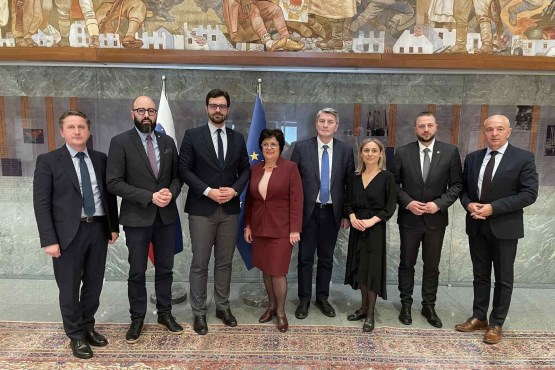4/9/2025
Delegate in the House of Peoples of the Parliamentary Assembly of Bosnia and Herzegovina Želimir Nešković and Members of the House of Representatives of the Parliamentary Assembly of Bosnia and Herzegovina Šemsudin Mehmedović and Jasmin Emrić as Members of the Green Club on a Study Visit to the Republic of Slovenia

In the organization of the Council of Europe’s School of Political Studies, members of the parliamentary green groups from the parliaments of Bosnia and Herzegovina and Montenegro are on a joint study visit to the Republic of Slovenia from 7th to 9th April this year.
The delegation of the Green Club of Bosnia and Herzegovina consists of the Deputy Chair of the Green Club and Delegate in the House of Peoples of the Parliamentary Assembly of Bosnia and Herzegovina (PABiH) Želimir Nešković, Members of the House of Representatives of PABiH Šemsudin Mehmedović and Jasmin Emrić, and Members of the House of Representatives of the Parliament of the Federation of Bosnia and Herzegovina Mirjana Marinković-Lepić, Damir Mašić, and Belmin Zukan.
On the first day of their stay in Slovenia, the members of the green parliamentary groups visited the Šoštanj Thermal Power Plant, where they had the opportunity to receive basic information from its management about the current operating regime in the context of gradual adaptation towards closure by 2033, as well as ongoing development projects that would ensure the utilisation, transformation, and sustainability of the infrastructure at the existing location, and the restructuring of this region with coal after the closure of the plant.
A meeting was held in the Parliament of the Republic of Slovenia with Meira Hot, Vice President of the Parliament, Miroslav Gregorič, Vice President of the Parliamentary Group for Infrastructure, Environment, and Spatial Planning, and Alma Intihar, President of the Parliamentary Friendship Group with Bosnia and Herzegovina.
Members of the Slovenian Parliament emphasised the traditionally good and friendly relations between our countries, which are also accompanied by concrete economic activities and a significant trade exchange.
They also highlighted that the Republic of Slovenia strongly supports and advocates for Bosnia and Herzegovina’s Euro-Atlantic integration, particularly emphasising the importance of adopting European laws to officially start the negotiation process, for which Bosnia and Herzegovina received the green light a year ago.
The Green Club members from Bosnia and Herzegovina informed the members of the Slovenian Parliament about the intention of the Republic of Croatia to establish a Centre for the Disposal of Radioactive and Nuclear Waste at Trgovska Gora, the micro-location of Čerkezovac, near the border with Bosnia and Herzegovina.
Given that the location was selected by the competent Croatian authorities through a political decision in 1999, when the Spatial Plan of the Republic of Croatia was adopted, without informing or involving Bosnia and Herzegovina as an affected party in the development and adoption of strategic documents concerning the construction of this nuclear facility, the members of the Green Club highlighted the unified position of the Parliamentary Assembly of Bosnia and Herzegovina, as outlined in the Resolution on the Opposition to the Construction of the Radioactive Waste, Spent Nuclear Fuel and Nuclear Waste Storage Facility at the Location of Trgovska Gora, which was unanimously adopted in 2016.
Regarding this issue, the Green Club members from Bosnia and Herzegovina expressed their gratitude to the members of the Slovenian Parliament for organising the meeting, their understanding, and expressed willingness for further cooperation and mutual exchange of information.
During the meeting, participants also discussed experience of the Republic of Slovenia, with the application of legislation for the closure of the Šoštanj Thermal Power Plant, as well as the use of funds for restructuring from the Just Transition Fund.
Since Bosnia and Herzegovina, as well as Montenegro, do not have available resources for financing the energy transition and the restructuring of electricity production from fossil fuels, the possibility was considered for Slovenia to advocate for the Western Balkans countries to access the Just Transition Fund.
On the second day, members of the green parliamentary groups from Bosnia and Herzegovina and Montenegro will visit the pump storage hydroelectric power station and the museum of the old hydroelectric power station in Avča. (End.)
|
PRESS
CONTACT |
Public relations department |

